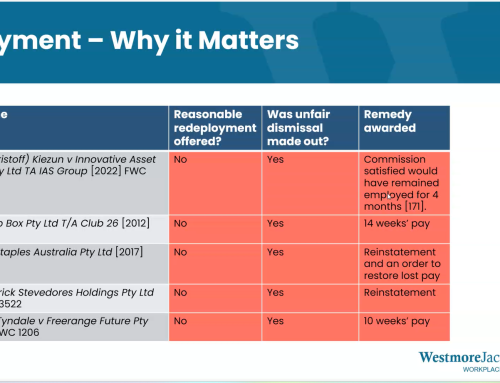
Introduction
As 2025 kicks off, we reflect on the substantial changes of last year.
In this article, we provide a high-level recap of some of the major changes in 2024. We also discuss what’s in store for 2025.
Casual employment – start date 26 August 2024
“Is Casual Employment Dead, Buried & Cremated? WestmoreJacobs’ current view is no.”
The meaning of casual employment in Australia has undergone a significant transformation, marked by landmark court decisions and legislative reforms. The journey began with Skene v Workpac.[1] In this decision a Full Court of the Federal Court held casual status is a matter of substance (whether the employee appears casual in practical reality) over form (what the employment contract says). Then, in March 2021, a legislated definition of casual employment was introduced which effectively required parties to look at their employment contracts to work out if an employee was casual. That approach was later reinforced by the Rossato High Court decision.[2]
Amendments in 2024 to the Fair Work Act 2009 (Cth) marked yet (another) crucial shift. These changes broadly introduced a multi-factor approach to determining the “real substance, practical reality, and true nature” of an employment relationship. Under the changes, an employee is a casual only if:
- there is no firm advance commitment to continuing and indefinite work; and
- they are entitled to a casual loading or specific rate of pay for casuals under a Fair Work Instrument or their employment contract.
At risk employers should be watching this space carefully and seeking advice to manage potential exposure.
Contractors – start date 26 August 2024
“Engaging contractors is, once again, a risky endeavour.”
Similar to determining casual employment status, a multi-factor approach is now used to determine whether someone is a contractor or an employee. Some helpful factors to consider include:
- the amount of control over how work is performed;
- financial responsibility and risk;
- who supplies the tools and equipment;
- ability to delegate or subcontract work;
- hours of work;
- expectation of work continuing;
- how hours of work are set; and
- registration for GST.
Right to disconnect – start date: 26 August 2024 (26 August 2025 for small business employers)
“The right to disconnect, of itself, is generally manageable for most employers. However, the general protection risk this right creates isn’t.”
Since 26 August 2024, employees of non-small business employers had the right to refuse to monitor, read or respond to contact (or attempted contact) outside their working hours, unless doing so is unreasonable.
The right to disconnect means employers should carefully review employment contracts and position descriptions for roles requiring out-of-hours availability.
Employers should also exercise caution when drafting performance warnings or dismissal letters, particularly in matters involving a lack of employee urgency in responding to others. Seeking early legal advice is crucial for employers managing these new obligations.
Costs in sexual harassment and discrimination claims – start date 2 October 2024
“There is significantly more pressure on employers to make larger settlement offers early.”
The Australian Human Rights Commission Amendment (Costs Protection) Act 2024 (Cth) introduced a modified equal access model for Federal Court and Federal Circuit and Family Court proceedings for sexual harassment and unlawful discrimination claims. There are two broad changes.
First, if an employee succeeds in a sexual harassment or unlawful discrimination claim, the employer will need to pay the employee legal costs, unless the employee’s own unreasonable conduct caused those costs.
Second, employees may only be ordered to pay employers’ costs in the following, relatively narrow, circumstances:
- if the employee’s unreasonable act or omission caused the employer to incur costs;
- if the employee initiated the proceedings vexatiously or without reasonable cause; or
- where the employer succeeds and it lacks a significant power advantage, or financial resources, over the employee.
Getting good advice early is key to navigating these changes.
Early impacts of IR changes made in 2023 – is the tidal wave beginning?
“It’s too early for most employers to feel the full force of these changes, yet. We are, however, already beginning to see the foundation for a new IR paradigm.”
Multi-employer authorisations have been made in a range of sectors, including childcare, mining, pre-schools, and social and community services. In childcare, a multi-employer agreement was made late 2024.
2024 also saw the Fair Work Commission (FWC) hand down decisions that will assist well advised employers take an informed approach to enterprise bargaining, including avoiding adverse outcomes.
Employers across a range of industries should expect more activity in the enterprise bargaining space in 2025 and beyond.
What’s ahead for 2025
Expanding ‘rights’ to WFH
“Currently, there is no general right to Work From Home (WFH) despite many having a WFH entitlement mentality. You should, however, expect that to change.”
Following the Modern Awards Review 2023-24, the FWC initiated a case to develop a WFH term for the Clerks Award. This Award has been identified as the most commonly used framework for WFH arrangements, with around 42% of clerical and administrative workers regularly working from home compared to employees across all occupations.[3] However, not all Awards are likely to see a WFH term.
The process will be a ‘slow burn’, with interested parties filing submissions by May 2025 followed by a direction hearing in June 2025. We anticipate a WFH term will be included in the Clerks Award later this year, with other Awards to follow suit where appropriate.
Employee ‘choice’ reforms regarding casual conversion – start date 26 February 2025 (26 August 2025 for small business employers)
“Receipt of an employee’s casual conversion notification can be the tactical start to a game of chess. Employers may be well advised to make their first move a good one.”
Soon, a non-small business casual employee can notify their employer in writing of their intention to become a permanent employee if they have worked for the employer for at least six months and believe they are no longer a casual.
The employer must respond within 21 days of receiving the notification and may refuse on three grounds:
- the employee still meets the definition of a casual;
- there are fair and reasonable operational grounds to refuse; or
- accepting the request is effectively against the law.
Victoria – inquiry into workplace surveillance laws
“Expect more regulation, not less.”
On 10 May 2024, an inquiry into workplace surveillance was referred to the Legislative Assembly Economy and Infrastructure Committee (Committee). The Committee is examining the effectiveness of current privacy and workplace laws in relation to employee workplace surveillance. There is concern that the current Surveillance Devices Act 1999 (Vic) may fall short in addressing various challenges including data security risks and increasing use of AI.
The final report is expected to be tabled in Parliament March this year, with potential recommendations on:
- dedicated workplace surveillance laws;
- surveillance practices and data handling;
- employee and family privacy protection;
- data security measures; and
- new technology regulations.[4]
Review of Secure Jobs amendments
“Expect more change.”
On 2 October 2024, an independent review of 2022’s Secure Jobs legislation (Review) commenced. This Review examines the Fair Work Legislation Amendment (Secure Jobs, Better Pay) Act 2022 (Cth) (Amendment Act), despite the legislation being only 2 years old.
The Review aims to investigate:
- whether the Amendment Act has been effective;
- whether there are unintended consequences of the Amendment Act; and
- whether further amendments are necessary to address any unintended consequences.
A report is due in March 2025 following stakeholder engagement and public submissions late last year.[5]
Conclusion
2024 was a transformative year with several important changes in employment law. This year, the momentum for change continues. Employers should stay vigilant about emerging changes, and seek legal advice early.
Adam Colquhoun (Principal) and Jolin Chao (Law Clerk)
This article is general information only. It is not legal advice. If you need legal advice, please contact us.
Citations:
[1] WorkPac Pty Ltd v Skene [2018] FCAFC 131.
[2] WorkPac v Rossato & Ors [2021] HCA 23.
[3] Fair Work Commission, Work and Care (Data Profile, 28 March 2024) 6.
[4] Inquiry into workplace surveillance, Legislative Assembly Economy and Infrastructure Committee, https://www.parliament.vic.gov.au/inquiryintoworkplacesurveillance.
[5] Review of the Secure Jobs, Better Pay Act, Department of Employment and Workplace Relations, https://www.dewr.gov.au/workplace-relations-australia/review-secure-jobs-better-pay-act.





